 MyDogBreeds
MyDogBreedsNeapolitan Mastiff is originated from Italy but Other is originated from United States. Neapolitan Mastiff may grow 20 cm / 7 inches shorter than Other. Neapolitan Mastiff may weigh 38 kg / 83 pounds lesser than Other. Neapolitan Mastiff may live 11 years less than Other. Both Neapolitan Mastiff and Other has almost same litter size. Neapolitan Mastiff requires Moderate maintenance. But Other requires Low maintenance
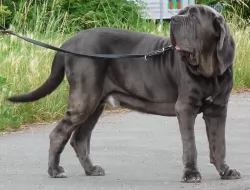 An ancient breed, the Neapolitan Mastiffs are massive dogs with a history of protecting their family and their property. The breed has deep rooted protective instincts and they are very frightening in appearance. The Neapolitan is of the Molosser group of dogs, all of whom probably came from the same line. It is known that all the mastiffs in Europe are descendants of the Tibetan Mastiff. The Tibetan Mastiff is considered the most ancient of all canines.
An ancient breed, the Neapolitan Mastiffs are massive dogs with a history of protecting their family and their property. The breed has deep rooted protective instincts and they are very frightening in appearance. The Neapolitan is of the Molosser group of dogs, all of whom probably came from the same line. It is known that all the mastiffs in Europe are descendants of the Tibetan Mastiff. The Tibetan Mastiff is considered the most ancient of all canines.
The Asian Mastiffs came from India to Greece around 300 BC with Alexander the Great. Then the breed was brought to the Romans by the Greeks and then introduced them in their circus in fights. Another possibility is that around 500 BC the mastiffs came to Britain from the Phoenicians. Either way the Roman Molossus is the ancestor of the Neapolitan Mastiff.
The Romans crossed the breed with the English Mastiff around 55 BC and developed a premiere war dog that was called a Mastini.
The breed eventually became extinct in Europe with the exception of Campania. The breed was recognized in 1946 with the standard accepted in 1949. However, it is believed that the Neapolitan Mastiff has been continuously present in Campania for over two thousand years. The breed was initially developed as war dogs and for the Roman coliseum spectacles.
In 1946 Dr. Piero Scanziani established a program to breed them in Italy. He wrote the breed standard in 1949.
Today the Neo is a farm dog, an army dog, a police dog and a guard dog. They were shown in Italy for the first time in 1946 but only in 2004 was the breed recognized by the American Kennel Club (AKC). It was 1973 when the Neapolitan Mastiff Club of America was born and 1996 when the standard was approved by the AKC. They are still a rare breed in the United States.
Dog lovers are thrilled because there is such diversity to choose from when looking for a pet.
There are so many other dogs that don’t have any particular breed name, and these can be tiny dogs or massive dogs that you would have to think twice about before buying one, as a large dog can eat you out of hearth and home.
All dogs, pedigreed or other, have descended from the wolf but it is unsure about when dogs were actually domesticated. One thing is sure, it is amazing to think that dogs descended from wolves but that you get so many varieties to day – different sizes, different coat colors and lengths, some have erect ears, others floppy, some are lean and mean and others muscular and heavily-set. They have all originated from different parts of the world.
There are well over 100 different pure dog breeds as well as plenty of other dogs. In fact you can create many different dogs by breeding certain of them to get the looks and characteristics you want.
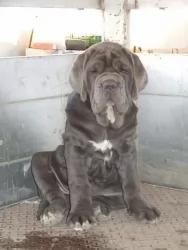 The Neapolitan Mastiff is a massive dog , so powerful and very intimidating in his looks. With an incredibly large head and hanging folds and wrinkles, the Neo is an impressive animal. His inner nobility and dignity is evident in his stance and the way he holds himself. He is relaxed, calm, quiet yet imposing none the less. His coat is dark whether black, tawny, gray or mahogany. He is muscular beyond imagination. The Neo is 10-15% longer than he is tall.
The Neapolitan Mastiff is a massive dog , so powerful and very intimidating in his looks. With an incredibly large head and hanging folds and wrinkles, the Neo is an impressive animal. His inner nobility and dignity is evident in his stance and the way he holds himself. He is relaxed, calm, quiet yet imposing none the less. His coat is dark whether black, tawny, gray or mahogany. He is muscular beyond imagination. The Neo is 10-15% longer than he is tall.
On his massive head his eyes are deep set and covered by his eye lids that droop. His eyes are blue as puppies then dark and coordinated with his coat. and his nose is large and the color of his coat. Ears are natural or can be cropped, and they carry their tail straight and curving back. The Neo has round paws and arched toes.
Dogs today come with so many looks. ‘Other’ dogs are vast and varied. They may be pedigreed dogs that are ‘off the radar’ or they may be among the many ‘cross-breed’ dogs there are.
You can get a tiny Chihuahua, measuring just 9cm in height, but you can also get a huge dog like the Great Dane that can stand at up to 90cm in height. It isn't however, a heavily built dog like the giant Newfoundland which can weigh up to 117 kg or so.
Some dogs are intelligent, others not so much. Others are social and others more reserved. Some won’t be able to tolerate being cooped up indoors and not being able to be outdoors involved in an activity, while others are more indoor dogs.
Some dog are friendly, others indifferent, some boisterous and sporty, others docile and lazy. There are so many other dogs that don’t make the pedigreed list, but they’re adored by their human family for being so utterly unique.
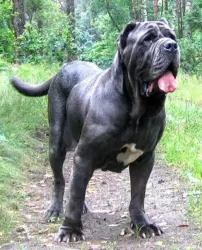 Older children in their family. No toddlers or strangers.
Older children in their family. No toddlers or strangers.
Protective yet quiet, calm, relaxed
No they won’t adapt well to apartment living or to strangers.
They are intelligent and trainable but must be socialized and know the human is the alpha or they will take over.
There are so many dogs, some are pedigree dogs and some aren’t. Some dogs are registered with kennel clubs and others aren’t.
Every dog has some amazing characteristics that make them so adorable. These kennel clubs divide dogs into categories such as Terriers, working dogs, herding dogs, toy breeds, hounds and so on. Pedigree breeds belong to these groups.
Other dogs are just as special, even if they don’t fall into the many dog breeds recognized by major kennel clubs.
There are so many other dog breeds, and if you want to bring some canine magic into your home and heart, apart from the very many expensive dog breeds out there, there are other dogs.
These are hybrids or true one-of-a-kind pavement specials that come at a fraction of the price but with the most amazing and wonderful characteristics you can imagine and which will make a most splendid pet.
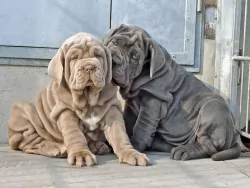 The Neapolitan Mastiff is prone to many of the same issues as any massive, extra large breed. The most common of these is Cherry Eye.
The Neapolitan Mastiff is prone to many of the same issues as any massive, extra large breed. The most common of these is Cherry Eye.
Other dogs are considered somewhat healthier than purebred dogs because they come from a broader gene pool. Nonetheless you still need to be aware of certain dog illnesses that your dog can develop -
This is a common ailment in dogs, and skin allergies can cause your dog a lot of discomfort and pain. They lick and lick and aggravate the situation. Sometimes fleas, chemicals and dog shampoos can aggravate the skin too. There are several things to look at – from making environmental changes to changing your dog’s food.
Cancer is common in dogs, just as in human beings, with there being a number of different cancers. Whenever you brush your dog, run your hands over him to check if there are any unusual lumps on him and have them examined if you do discover a lump.
Other dog illnesses to watch out for include bloat, ear and eye infections, cataracts, hip dysplasia and obesity, among others.
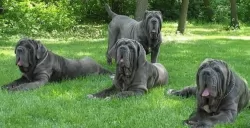 Neapolitans grow fast and so don’t overfeed when they are young. Lower protein and higher fat content.
Neapolitans grow fast and so don’t overfeed when they are young. Lower protein and higher fat content.
Don’t overfeed the adult as they can become obese.
This big hearty breed needs exercise but not too much. They overheat easily. The puppy will push himself, so you have to make sure he doesn’t over do it. No tug of war games. They need a long walk twice every day.
Responsible dog owners know that their dogs require adequate food and water, lots of love and attention, exercise, a warm, dry bed, shelter from the elements when outdoors and medical attention when they’re sick.
One advantage with other dogs which aren’t pedigreed, is that by their very nature, they have good genetic diversity, and this means good overall health. Other dogs breeds are generally cheaper to buy and cheaper in terms of vet’s fees as they tend to be healthier.
Other dogs have a variety of different coat types, so whatever dog you have, you’ll need to be looking at brushing him, stripping him or having him professionally clipped. Whether erect or floppy ears, check inside for infection. The eyes will also need to be checked for infection and other eye ailments. All dogs will also have to have their nails clipped.
The size of all dogs, pedigree or other will determine the amount of food you give him. Big or small, pedigreed or other, every dog wants the same when it comes to diet. They want food which is nutritious, tasty and simple. They want a high quality commercially manufactured food high in minerals and vitamins.
They will benefit from some raw meat added into the kibble whenever its possible. They will also require some home-made food – simple, uncomplicated homemade food such as boiled chicken, brown rice or pasta and vegetables such as sweet potato, carrots and spinach. Such a diet will keep your pet free from digestive problems. Make sure he has a constant supply of cool, fresh water.
Exercise is important for every dog, but some dogs will require more exercise than others. Some dogs will be content with a walk every day while others will require far more – running beside you while you cycle, swimming, a run in the park, rope- and ball games and going with you on hikes.
Exercise is both entertaining for your dog and healthy too.